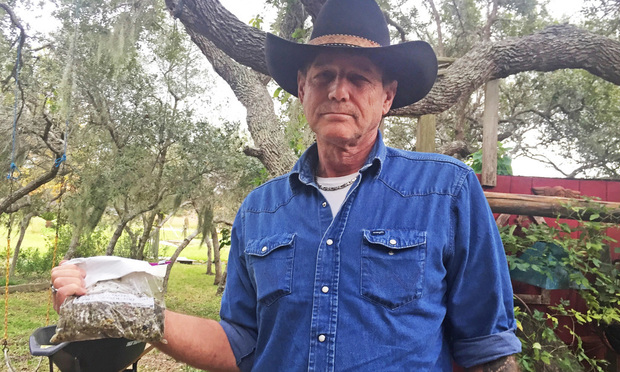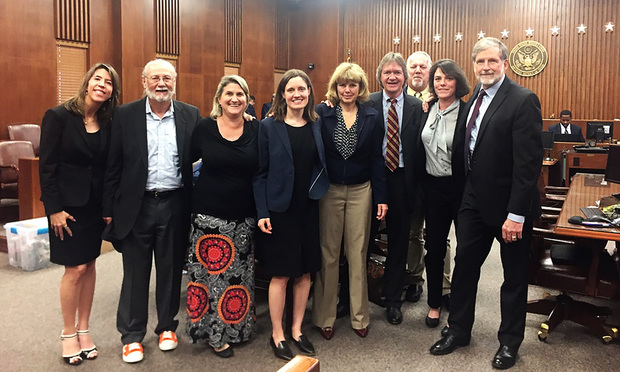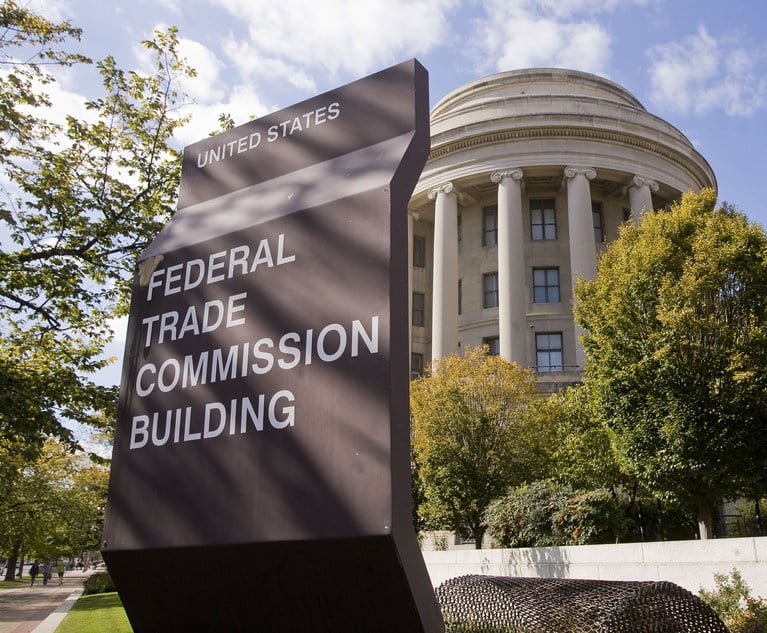Texas Lawyers Score $50 Million Settlement in Clean Water Act Case
Plaintiffs counsel said the Clean Water Act settlement may be the largest ever in the nation.
October 16, 2019 at 03:56 PM
5 minute read
 Dale Jurasek holds a sample of the plastic pellets that Formosa Plastic discharges. Courtesy photo
Dale Jurasek holds a sample of the plastic pellets that Formosa Plastic discharges. Courtesy photo
A team of attorneys working alongside Texas RioGrande Legal Aid has scored a $50 million settlement and $3 million in attorney fees from a plastics company that's polluted coastal bays off the Gulf of Mexico for years.
The plaintiffs, San Antonio Bay Estuarine Waterkeeper, a community group that protects the bays, and one of its leaders, Diane Wilson, and defendant Formosa Plastics Corp. entered the settlement Tuesday and submitted their consent decree to the federal government for review. Formosa has also promised to pay future attorney fees for the life of the consent decree.
"The conditions agreed to in this settlement demonstrate Formosa's commitment to manufacturing our products in a safe and environmentally friendly manner," said a statement by Formosa USA executive vice president Ken Mounger.
The $50 million Clean Water Act settlement may be the largest in the nation, said Amy Johnson, lead counsel for the plaintiffs. The highest she's seen previously was $10 million, said Johnson, an environmental law solo practitioner who has served as a paid consulting attorney at Texas RioGrande Legal Aid for five years.
She said it's very significant that Formosa agreed to bring its plastics discharges down to zero in the future.
"The mitigation that will come back to the community is huge," Johnson added.
Texas RioGrande Legal Aid spearheaded the case after learning about Formosa's pollution problem while it was surveying the area about its legal needs, said Erin Gaines, staff attorney for environmental justice at Texas RioGrande Legal Aid in Austin. Most legal aid providers represent low-income individuals with single-case civil matters, and it's rare for legal aid providers to handle massive environmental justice cases. But Texas RioGrande Legal Aid is one of the few in the country that's tackled environmental work, starting with fights for poor Texans living in colonias to get safe drinking and wastewater systems, Gaines said. She said the organization has grown its environmental law practice to meet a need it saw within the community.
 Left to right: Dr. Aiza Jose-Sanchez (expert witness), Bob Lindsey (representative of plaintiff Waterkeeper), Spring Beckman (paralegal), Erin Gaines, Amy Johnson, David Bright, Mike Gilmore (AV for trial), Jennifer Richards, David Frederick. Courtesy photo
Left to right: Dr. Aiza Jose-Sanchez (expert witness), Bob Lindsey (representative of plaintiff Waterkeeper), Spring Beckman (paralegal), Erin Gaines, Amy Johnson, David Bright, Mike Gilmore (AV for trial), Jennifer Richards, David Frederick. Courtesy photoThe settlement comes after the plaintiffs won a court ruling in June that found Formosa was liable for widespread plastics pollution, and should be sanctioned for past violations, subjected to injunctive relief to stop future pollution. Formosa was also ordered to pay attorney fees. The parties were preparing for the second hearing in the bifurcated trial, which would have determine the remedy, when the settlement was reached.
Formosa promised in the consent decree to clean up its past pollution, and agreed to take steps to eliminate the discharge of plastics from its Point Comfort plant within the next three years.
The $50 million settlement, due in installments over the next five years, will benefit the environment and community surrounding Lavaca and Matagorda bays, which are adjacent to the coastal communities of Point Comfort and Port Lavaca. Formosa's plant in Point Comfort was the source the plastic pellets, called "nurdles," that polluted the bay systems. Nurdles are the raw material from which most plastic goods are manufactured.
Nearly $20 million will fund a nonprofit effort to create a fishing cooperative to revitalize marine ecosystems and boost the area's fishing, shrimping and oystering industries, which declined partially because of the pollution. Calhoun County will receive $12 million to develop a new park and to restore one beach where nurdles were found. Other funds will go to various nonprofits to establish outdoor and environmental education programs for children, a "Nurdle Patrol" to monitor the bays for pollution, and grant awards to people or groups to conduct conservation projects, environmental research, and habitat restoration.
Other attorneys on the plaintiffs team are David Frederick, partner in Frederick, Perales, Allmon & Rockwell in Austin, also an adjunct professor and research fellow at the University of Texas School of Law's environmental clinic; and David Bright, of counsel in Sico Hoelscher Harris in Corpus Christi.
"Our clients have been working on these issues and going out there almost daily for years, and bringing up these issues to state agencies, federal agencies, to government officials, and others," Gaines said. "They really feel like this is a turning point in terms of Formosa paying for the past pollution and all of that, but also, holding them more accountable moving forward."
Kelly Hart & Hallman partner Steve Ravel of Austin, who represented Formosa, declined to comment.
Read the settlement:
This content has been archived. It is available through our partners, LexisNexis® and Bloomberg Law.
To view this content, please continue to their sites.
Not a Lexis Subscriber?
Subscribe Now
Not a Bloomberg Law Subscriber?
Subscribe Now
NOT FOR REPRINT
© 2025 ALM Global, LLC, All Rights Reserved. Request academic re-use from www.copyright.com. All other uses, submit a request to [email protected]. For more information visit Asset & Logo Licensing.
You Might Like
View All
Lennox Hires 12-Year Company Veteran as CLO, Bucking Hire-From-Outside Trend
3 minute read
'Strong' Legal Theory or 'Oxymoron'? Experts Eye FTC Antitrust Suit Against Mattress Merger
5 minute read
This Judge Hoped to Be Reversed: Good News for Plaintiffs in Asbestos MDL
4 minute read
Senior American Airlines Attorney Lands Back at Kimberly-Clark, This Time as GC
Trending Stories
- 1Munger, Gibson Dunn Billed $63 Million to Snap in 2024
- 2January Petitions Press High Court on Guns, Birth Certificate Sex Classifications
- 3'A Waste of Your Time': Practice Tips From Judges in the Oakland Federal Courthouse
- 4Judge Extends Tom Girardi's Time in Prison Medical Facility to Feb. 20
- 5Supreme Court Denies Trump's Request to Pause Pending Environmental Cases
Who Got The Work
J. Brugh Lower of Gibbons has entered an appearance for industrial equipment supplier Devco Corporation in a pending trademark infringement lawsuit. The suit, accusing the defendant of selling knock-off Graco products, was filed Dec. 18 in New Jersey District Court by Rivkin Radler on behalf of Graco Inc. and Graco Minnesota. The case, assigned to U.S. District Judge Zahid N. Quraishi, is 3:24-cv-11294, Graco Inc. et al v. Devco Corporation.
Who Got The Work
Rebecca Maller-Stein and Kent A. Yalowitz of Arnold & Porter Kaye Scholer have entered their appearances for Hanaco Venture Capital and its executives, Lior Prosor and David Frankel, in a pending securities lawsuit. The action, filed on Dec. 24 in New York Southern District Court by Zell, Aron & Co. on behalf of Goldeneye Advisors, accuses the defendants of negligently and fraudulently managing the plaintiff's $1 million investment. The case, assigned to U.S. District Judge Vernon S. Broderick, is 1:24-cv-09918, Goldeneye Advisors, LLC v. Hanaco Venture Capital, Ltd. et al.
Who Got The Work
Attorneys from A&O Shearman has stepped in as defense counsel for Toronto-Dominion Bank and other defendants in a pending securities class action. The suit, filed Dec. 11 in New York Southern District Court by Bleichmar Fonti & Auld, accuses the defendants of concealing the bank's 'pervasive' deficiencies in regards to its compliance with the Bank Secrecy Act and the quality of its anti-money laundering controls. The case, assigned to U.S. District Judge Arun Subramanian, is 1:24-cv-09445, Gonzalez v. The Toronto-Dominion Bank et al.
Who Got The Work
Crown Castle International, a Pennsylvania company providing shared communications infrastructure, has turned to Luke D. Wolf of Gordon Rees Scully Mansukhani to fend off a pending breach-of-contract lawsuit. The court action, filed Nov. 25 in Michigan Eastern District Court by Hooper Hathaway PC on behalf of The Town Residences LLC, accuses Crown Castle of failing to transfer approximately $30,000 in utility payments from T-Mobile in breach of a roof-top lease and assignment agreement. The case, assigned to U.S. District Judge Susan K. Declercq, is 2:24-cv-13131, The Town Residences LLC v. T-Mobile US, Inc. et al.
Who Got The Work
Wilfred P. Coronato and Daniel M. Schwartz of McCarter & English have stepped in as defense counsel to Electrolux Home Products Inc. in a pending product liability lawsuit. The court action, filed Nov. 26 in New York Eastern District Court by Poulos Lopiccolo PC and Nagel Rice LLP on behalf of David Stern, alleges that the defendant's refrigerators’ drawers and shelving repeatedly break and fall apart within months after purchase. The case, assigned to U.S. District Judge Joan M. Azrack, is 2:24-cv-08204, Stern v. Electrolux Home Products, Inc.
Featured Firms
Law Offices of Gary Martin Hays & Associates, P.C.
(470) 294-1674
Law Offices of Mark E. Salomone
(857) 444-6468
Smith & Hassler
(713) 739-1250






